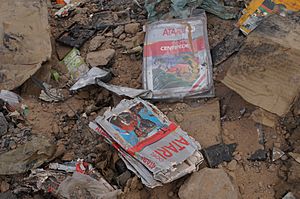Video game crash of 1983 facts for kids
The video game crash of 1983 was a big problem for the video game industry. It happened mostly in the United States between 1983 and 1985. This event is also called the Atari shock in Japan.
For about two years, the video game world faced a major slowdown. Many companies that made home computers and video game consoles went out of business.
Contents
Why the Video Game Crash Happened
Several things caused the crash. One big reason was that too many video game consoles and games were being sold. This is called market saturation. Many of these games were not very good, often called "shovelware".
People also started losing interest in console games. They began to prefer personal computers instead.
In 1982, so many new games came out that stores couldn't hold them all. There wasn't enough space for new games and consoles. When stores tried to return the extra games to the companies that made them, these companies often had no money to give refunds.
Many game publishers, like Games by Apollo and U.S. Games, quickly closed down. Stores couldn't return unsold games to these closed companies. So, they sold the games at very low prices. Games that cost about $35 (which would be $99 today) were sold for just $5 (about $14 today).
What Happened After the Crash
The video game industry changed a lot because of the crash. Some companies left the business completely.
Magnavox stopped making video games. Imagic was going to sell its stock to the public but stopped at the last minute. This company later failed. Activision had to get smaller in 1984 and 1985 because they lost a lot of money. To stay in business, they started making games for personal computers. After a few years, Activision only made computer games and stopped making games on cartridges.
Atari was one of the companies hit hardest by the crash.
Even the arcade video game market became weaker. The "golden age" of arcade games came to an end around this time.
How the Industry Recovered
The video game console industry in North America got better a few years later. This was mostly thanks to Nintendo.
Nintendo released its Nintendo Entertainment System (NES) in 1985. This console was known as the Famicom in Japan. The NES was designed to avoid the mistakes that caused the 1983 crash. It also helped change how people thought about video games.
Images for kids
-
The Commodore 64 survived the crash and became one of the best-selling computers of all time.
See also
 In Spanish: Crisis del videojuego de 1983 para niños
In Spanish: Crisis del videojuego de 1983 para niños
 | Stephanie Wilson |
 | Charles Bolden |
 | Ronald McNair |
 | Frederick D. Gregory |





